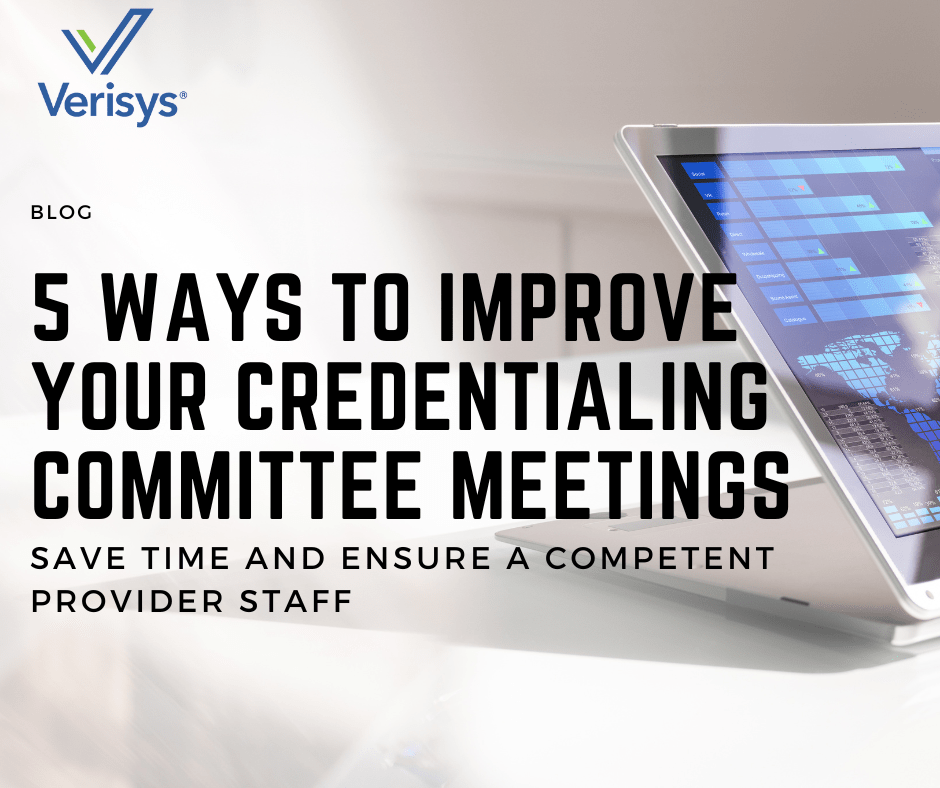– The best resource for monthly healthcare regulatory compliance updates. Compliance Updates: April 2024 Overlook: Licensure Compacts Other Legislation Board Updates Interstate Medical...


Planning for Provider Credentialing Committee Meetings Saves Time and Assures a Competent Provider Staff Our work schedules are jam-packed with meetings, leaving little to no time to prepare for them effectively. Any delay in receiving the agenda and relevant material further adds to this challenge. Like most committees, a lack of effective leadership can negatively impact the function of the committee and the organization. In the case of the credentials committee, insufficient preparation of materials and disorganization can lead to ineffective or even dangerous provider approvals. A single incident of credentialing an under qualified provider can have long-term consequences for a healthcare organization. Below, we will look at five ways to improve your credentialing committee.
The time spent reviewing the skills and background of providers applying for appointment and reappointment makes a difference in the: ✔ Hospital’s reputation ✔ Quality of care provided ✔ Patient safety So, whether you are the credentials committee chair or a committee member, here are ways you can help improve your credentials committee:
1. Review files prior to the meeting. The committee chair should work with the medical staff professional (MSP) to categorize the files into three groups:
Categorizing files saves time on the meeting day and helps committee members prioritize which files to review before the meeting.
2. Only review files with complete applications. If an application is missing key pieces, such as a scan through a primary source or a copy of their license, table the application. These files should not be sent to committee members or discussed at the credentialing committee meeting until the file is complete.
3. Send files and agendas out to members with enough time to review them before the meeting. As the chair, consider setting aside a set time on a weekly or monthly basis to prepare for the committee meeting. This time could include meeting with the MSP to review pending files or developing the agenda. Try sending the agenda and completed files out well in advance to committee members. This may allow for more meaningful discussion on the meeting day, especially for those files that need careful review.
4. Make the meeting a priority. The credential committee chair should arrive early to greet and thank members as they arrive. This helps demonstrate the importance of the committee’s work. As a member, reach out to the committee chair with your concerns about potential applicants, especially ones needing review, if you can’t make a meeting.
5. Actively participate in the meeting. The committee chair should lead the discussion of applicants, starting with the ones that need further review. These files should be discussed at length with active participation from all members. Discussion should focus on the applicant rather than whether the organization needs additional providers.
As a first step, pre-screening all applicants ensures that only viable applicants are presented to the credentials committee for review. Pre-screening candidates for hire or reappointment demonstrates respect for the credentials committee’s time and the process. As a credentialing verification organization, Verisys has a variety of solutions that can meet your organization’s credentialing needs. Our solutions are fully accredited by NCQA and URAC, allowing us to maintain the industry’s highest data and compliance standards. Verisys’ proprietary dataset, Fraud Abuse Control Information System (FACIS), is the largest and most comprehensive dataset for screening allied health and medical providers. With over 5.5 million provider records and 30 years of aggregated data, FACIS ensures you get the most accurate results. FACIS is accessed through our secure search portal, Verisys Connect®, making it readily available when needed. FACIS makes pre-screening applicants easy by checking an applicant’s national current and historical records for:
FACIS is continuously updated, giving you real-time results, even on the committee meeting day. A single search through FACIS screens over 5,500 primary sources, including the following:
A simple search through Verisys’ FACIS database helps prevent your healthcare organization from hiring or engaging with healthcare providers that may introduce unnecessary risk to your organization. Make your pre-screening process easier with Verisys. Get started today.